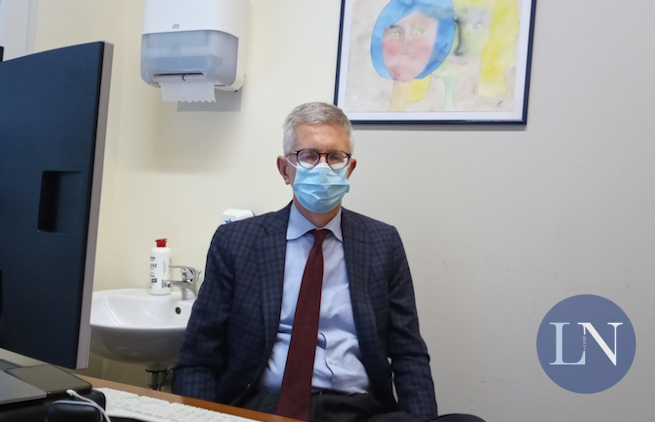
—
 —-
—-
From support to health workers working on the front line to the ad hoc outpatient clinic for those who, due to the virus, went “in crisis”
The interview with the director of the Mental Health department on Covid, the virus that has revolutionized our daily lives: “It will leave after a long time”
LECCO – It’s the thinner flap, the one that has already shown its disruption, but which could come out in all its acuteness in a few months, or perhaps in a few years.
An emergency within an emergency not only for those called to work at the forefront on the hospital front between intubated patients and CPAP, but also for those who have seen their own everyday change one day with another, rediscovering the many limits of the human being with overwhelming actuality.
They are many, varied and in some ways still … muted i psychological reflexes linked to the coronavirus pandemic, health crisis from world borders which, with its burden of physical distancing and fear of contagion, has forced everyone to rearrange the daily routine and to always be ready and flexible to face new and changing scenarios.
 —-
—-
The first intervention in hospitals
He knows it well Antonio Lora, head of the department of Mental Health of Asst Lecco, committed to reorganizing, today as in the last spring, the departments and local services to make sure that they can better deal with a health emergency that it will leave traces, even deep ones, in everyone’s soul. “I can say that we moved immediately and in time to tackle the dramatic situation that healthcare personnel were facing last spring in the hospitals of Lecco and Merate, which were converted, in a few days, as Covid wards. We were guided by the indications provided by the scientific literature on similar epidemic situations, like that of SARS, in which states of anxiety, depression and post-traumatic stress were recorded in hospital staff “.
Aim to reduce emotional tension
Thanks to the involvement of the EMDR emergency team, it was possible to intervene immediately last spring. “A very important detail because the sooner we intervene on the front line, the better. It was necessary to collect the emotions of doctors, nurses and health workers who found themselves catapulted to face a difficult disease, with high mortality and with few weapons available. The goal was reduce emotional tension of those who worked in the covid departments and I must say that we have had a positive return from the users of this service “.
The drama of isolation
The function of supporting and supporting emotions, often unmanageable if not paralyzing, has also extended to people with Covid and their families, struggling with a virus that has banned the possibility of being close to and supporting one’s loved one in difficult, delicate and personal moments. “People were dying and dying alone, without being able to greet loved ones. And this was a devastating and dramatic aspect that involved the victims, their relatives, but also the health personnel ”.
A reactivated support for the second wave
The presence of a psychological crisis unit was found to be fundamental to stem the flood of emotions and experiences that would otherwise be difficult to process independently. “Not surprisingly, today, in the face of the second wave, we have reactivated this service, making available a team of experts for hospital staff who, in the ward, have neither the time nor the space to express their efforts, their anxieties, one’s own pain ”.
The goal is to simply give the opportunity to speak, avoiding that silence creates interior walls, which are then difficult to break down, built with the bricks of anxiety, depression and fear. In short, relating with oneself and others, in a time when interpersonal distance seems to be one of the main ways to counter the contagion and avoid the spread of the epidemic. A nice paradox which makes it even more difficult to find within oneself the resources to face a long, suspended and extended health crisis.
Pandemic fatigue
From songs on the terraces to Everything will be fine painted with the colors of the rainbow on the banners affixed to the balconies, we went on to try, each with different shades and intensities of gradations, widespread fatigue. There are those who call it pandemic fatigue and those who, without being too surprised, put it into account knowing full well that the first attack is always more tough than the second. It will be the nature of man and it will also be the fact that even the highest resilience capacity he comes to the breaking point if he is constantly under stress.
“Unfortunately there are no magical recipes to apply to this context”Lora admits realistically, aware that the scenery before her eyes is not rosy. The perspective is of a winter and a spring still marked by the shadows of Covid, with an accordion style, between major and minor restrictions depending on the curve of the infection, which will still leave us far from the normality to which we were used to before, when the smile was not hidden by the masks, you could hug and have a coffee in peace.
The psychological fallout from Covid
It goes without saying that the psychological effects of Covid have already been recorded across the entire population. And even if the numbers have not yet been accounted for, the creation of speaks for itself to a ambulatorie to follow those who, following the lockdown last March, highlighted anxieties, fears and fears. Ordinary people, perhaps subjected to greater stress due to the fact of working in “sensitive” places with a high probability of contagion or individuals already close to a fragile family or relational context, made even more unlivable than forced closure.
Anxiety, panic attacks and fears are on the rise
“In recent times we have also registered access to our psychological assistance services for men and women who they had never knocked on our door before Covid“. People gone, to put it simply, in crisis and who, independently or thanks to the advice of the GP, have decided to ring the bell of experts to try to put their tangle of emotions in order. Then there are the recovered Covid patients for whom the hospitalization experience, especially if long and demanding, has left a huge echo inside and who, like the patients treated at CPS, have seen their listening times reduce and care due to the health emergency.
A few months after the emergency they emerged already the first cracks, unfortunately destined not to remain the only ones. “In a couple of years we will be able to fully realize the aftermath that Covid has left in all of us. Studies are underway on this. We’ll see”.

—
 —- –
—- –

